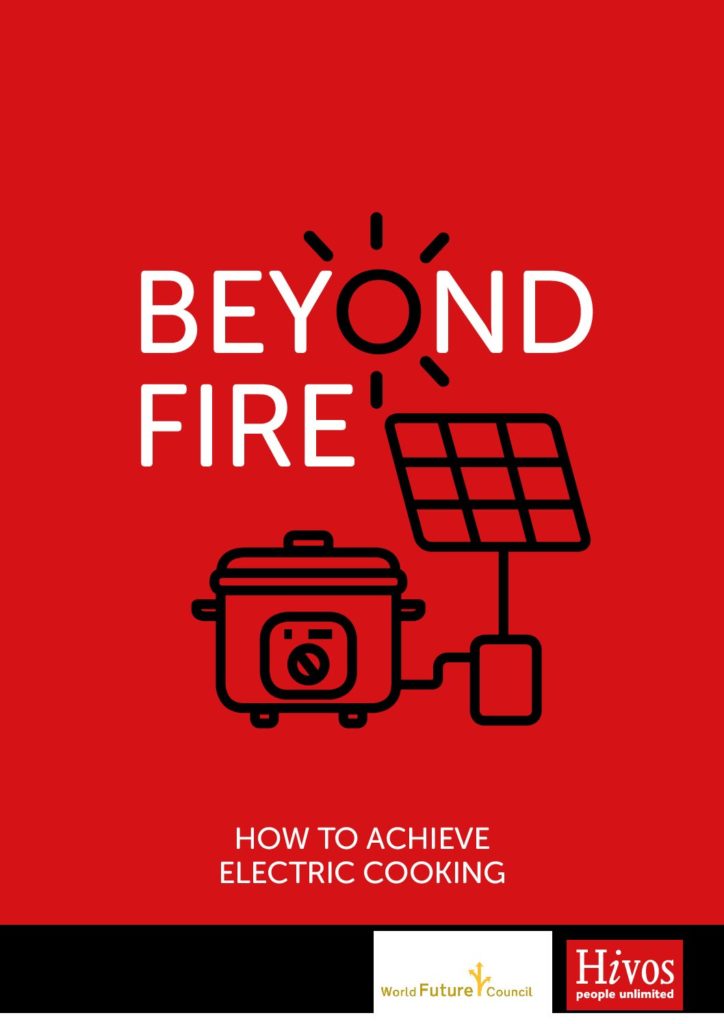Cooking with renewable electricity is now cost-competitive with other cooking alternatives in most developing countries, concludes a new report called Beyond Fire: How to achieve electric cooking by Hivos and World Future Council. This is a significant improvement from three years ago when the two organizations studied this for the first time.
Achieving sustainable cooking is one of the great challenges of our time. Cooking with charcoal and firewood sources still accounts for 4 million premature deaths due to indoor air pollution, puts significant strain on already stressed forest resources, and it is the single largest source of greenhouse gas emissions (GHGs).
“For almost two decades we have inadvertently narrowed the debate of clean cooking to just cook stoves. We need to look at the sources of energy and clean fuels”, says Kandeh Yumkella, Parliamentary Leader Sierra Leone, first CEO of Sustainable Energy for All and former UN Special Representative and Director General of UNIDO.
Hivos and World Future Council (WFC) just released a study that unveiled the cost-competitiveness of cooking with renewable energies. Eco Matser, Program Manager Energy & Climate at Hivos responds: “We looked into alternatives that provide long term sustainable solutions rather than quick intermediate fixes such as improved cook stoves”.
Cooking appliances examined are solid fuel based stoves (wood and charcoal), gas based stoves (LPG, biogas and power to gas) and electric cooking (electric hot plate, induction stove, slow cooker and pressure cooker) in both mini-grid contexts and via solar home systems.
“The report shows that the costs of cooking with electricity – both in mini-grid contexts and via solar home systems – is now well within the range of cost-competitiveness of other cooking alternatives. Households spend on average between EUR 1 – EUR 31/month on cooking fuels. With electric cooking with Solar Home Systems (SHS), this is between EUR 5 – EUR 15/month. The costs per household of cooking with a mini-grid range from EUR 4 – EUR 36/month,” says Anna Leidreiter, Director Climate Energy with the World Future Council.
One of the reasons of the significant improvement in the economic viability of electricity-based options is the dropped costs of both solar modules and batteries, since early 2016 between 30-50%. They continue to decline as markets scale-up and technologies improve. But perhaps even more significant is the use of high-efficiency cooking appliances, which helps to reduce electricity consumption as well as the total size of the solar PV and battery systems required to run cooking appliances.
The system-level savings of adopting high-efficiency end-use appliances have the potential to mirror the transformative effects that low-cost LED lighting has had in the off-grid solar sector.
In 2016, when the first version of the report was launched, the two organizations focused on providing a snapshot of the technical solutions available. “At that time, they were however still too expensive to compete with the traditional way of cooking.” Eco Matser explains. “This new study calculates the costs range for cooking with various different appliances in which both the upfront costs, as well as the ongoing usage-related costs are taken into account.” Kandeh Yumkella: “This new report is very timely as we need to raise the profile of the clean cooking challenge.”
It concludes with six concrete recommendations on how to put electric cooking firmly on the political agenda. From setting clear goals to incentivizing reducing upfront costs and mobilizing climate finance to play a far greater and more direct role in supporting the transition to sustainable cooking.
In light of the estimated USD 110 billion in annual costs to human health, to the environment, and to local economies caused by the use of solid fuels like wood and charcoal for cooking, “it is time that the transition to sustainable cooking is put in motion”, Eco Matser concludes.
Quotes:
“This report is unique in a sense that it covers all aspects of cooking. I believe electric cooking is modern and less polluting if the electricity comes from renewable sources. This report will help the world community, incl. practitioners, users, policy makers, advocates, funding agencies and international organizations to understand and take action to implement electric cooking in a sustainable fashion in their respective regions.”
Dipal Chandra Barua, Co-founder of the Grameen Bank, Founding Managing Director of the Grameen Shakti, Founder and Chairman of the Bright Green Energy Foundation, President of the South Asian Network for Clean Energy (STANCE and WFC Councilor).
“Now more than ever, there is an opportunity to accelerate innovation and demonstrate the impact a modern clean cooking industry could deliver. As the new Beyond Fire report outlines, affordable, user-friendly electric cooking, whether powered by solar home systems, mini-grids, or alternative sources, is the type of advancement that could dramatically propel this sector forward.” Dymphna van der Lans, CEO Clean Cooking Alliance
###
Contact:
Merit Hindriks
The report can be downloaded here.
Authors
Beyond Fire: How to achieve electric cooking? is prepared by Toby D. Couture (E3 Analytics) and Dr. David Jacobs (IET – International Energy Transition GmbH).
About Hivos
Hivos is an international organization that seeks new solutions to persistent global issues. With smart projects in the right places, we oppose discrimination, inequality, abuse of power and the unsustainable use of our planet’s resources. Hivos works towards a green society that has no expiry date. A society powered by renewable energy.
For more information visit www.hivos.org
About the World Future Council
The World Future Council (WFC) works to pass on a healthy planet and fair societies to our children and grandchildren. To achieve this, we focus on identifying and spreading effective, future-just policy solutions and promote their implementation worldwide. Jakob von Uexkull, the Founder of the Alternative Nobel Prize, launched the World Future Council in 2007. We are an independent, non-profit organisation under German law and finance our activities from donations.
For information visit www.worldfuturecouncil.org




